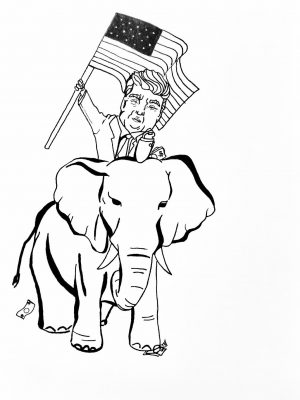Killing the Conservative Paradigm
February 5, 2017
In years past, both Democratic and Republican presidential candidates have closely represented the views of their respective parties. This is no such year. The campaign promises of President Donald J. Trump show just how atypical of a Republican President he will be.

The change of the Republican party and its president throughout the election has been a remarkably bizarre transition from past party policy. The divorce of the party from the economic message of administrations before has signaled at least a temporary shift to the adoption of the blue collar democratic rhetoric reminiscent of the New Deal. President Trump’s now infamous “build a wall” promise serves as the bedrock of his “America first” economic message. President Trump has voiced opposition to such trade organization as NAFTA and the TPP. He has also vowed to heavily tax American manufacturers attempting to outsource production. This message runs counter to the very basis of Republican economic messages characterized for decades by free market, neoconservatism.
The Reagan and Bush administrations all emphasized free markets as central policy. President Trump has vowed he will not in all but explicit terms. The bizarre truth to Trump’s economics is that it is a classically Democratic position of working class first policy. By rejecting outsourcing and threatening to tax outsourced products, President Trump has broken from long held Republican policy. The most telling example of this may be Donald Trump’s well documented disdain for the North American Free Trade Agreement, or NAFTA for short. NAFTA is a prime example of the success of free trade, as well as one of President Reagan’s most successful policy ideas. President Clinton broke from Democratic tradition in 1994 and moved away from working class Democratic roots.
Changes in party policy are not unheard of in American history. In centuries past the policies of the Republican and Democratic parties have been inverted, and they may switch again. President Trump’s economic shift could be indicative of a major change in GOP economic policy.





